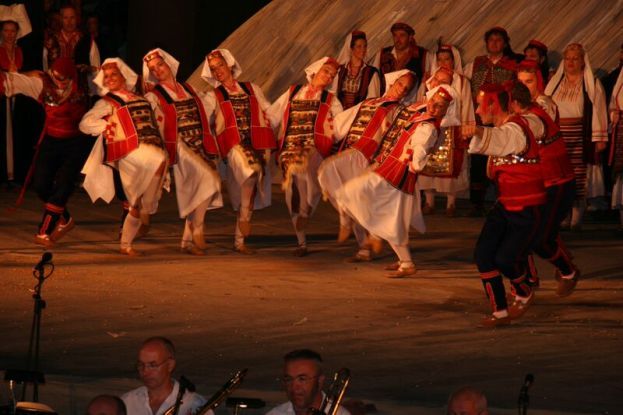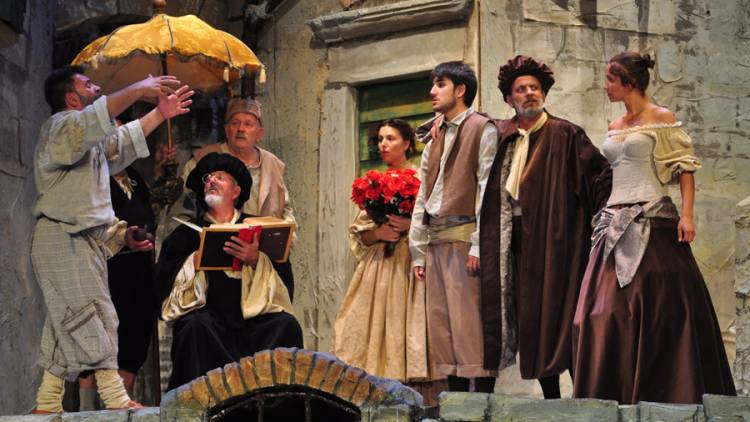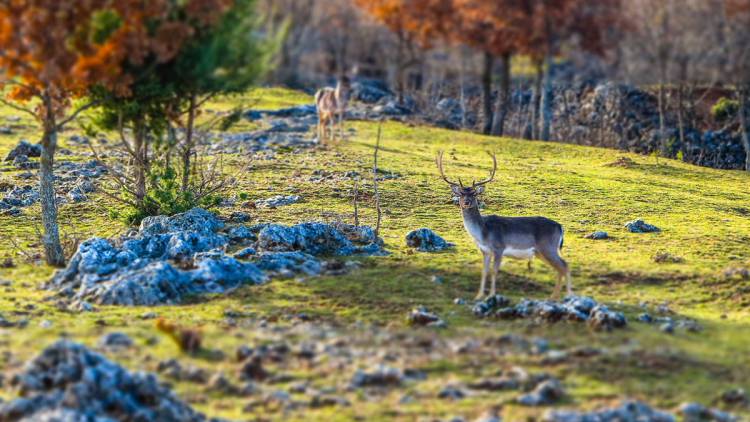From Brown Bear to Slow Worm - The Rich Vrlika Fauna and Flora
Flora
Native vegetation of the Vrlika region comprises a large number of plant communities, or habitat types. According to the data available, in the area of the Dinara mountain there are around 750 plant species, of which more than 110 are strictly protected and 55 are endemics.
The flora comprises:
- Mountain Grasslands
- Scopoli's Rock Cress
- Dinarian Mouse Ear
- Dalmatian Rockbell
- Pasque Flower
- Lion's Paw
- Yellow Gentian
- Common Juniper
- Hairy Azalea
Fauna
1. Birds
In terms of ornithology, the Vrlika region, particularly the peaks and the slopes of the Dinara mountain appertaining to it and the habitat around the Upper Cetina, from its source to the Peruća dam, is designated as a Special Protection Area (SPA) according to the EU Directive on the Conservation of Wild Birds.
The bird species include:
- Shore Lark
- Redshank
- Stone Curlew
- Moustached Warbler
- Short-toed Snake Eagle
2. Mammals
The mammals of the Vrlika region are:
- Brown Bear
- Grey Wolf
- Eurasian Lynx
- Wildcat
- Red Fox
- Wild Boar
- Eurasian Badger
- Brown Hare
- Balkan Snow Vole
3. Insects
The relatively well-preserved, extensive and diverse habitats of the Dinara and Svilaja mountains and the Upper Cetina provide a refuge to a number of invertebrate species whose natural habitats have been endangered due to specific living conditions they require, while many of them are endemics and placed on the Red List (certain species of caddisflies, dragonflies, stoneflies, orthoptera, etc.).
Invertebrates living in caves and holes make a special group – their biology remains relatively unknown, but they are protected as the cave fauna together with cave vertebrates.
Insects include:
- Dalmatian Ringlet
- Rosalia Longicorn
- Longhorn Beetle
- Firebug
- Hornet
- Bumblebee
- Stag Beetle
- Marsh Fritillary
4. Herpetology
The herpetofauna of the Vrlika region comprises around 15 species of lizards, snakes and amphibians, some of which are endangered, mostly due to the fact that their natural habitats have been either reduced in extent or suffered degradation.
The herpetofauna comprises:
- Smooth Snake
- Balkan Whip Snake
- Nose-horned Viper
- Fire Salamander
- Slow Worm
- Karst Meadow Viper
- Alpine Newt
Amazing Promo Video of Vrlika
You can easily fall in love with Vrlika after watching this amazing promo video from the Vrlika tourist board. So much beauty in 4 minutes - heritage, culture, nature, adventure, sports and more - watch the movie below and visit Vrlika!!
#ExperienceNature ... Town of #Vrlika #InlandDalmatiaPure #InlandDalmatia, #Croatia ... #History, #Heritage and #Nature at its best :)
Posted by Vrlika Tourist Board on 20. november 2013
Split Scientists Discovered a Rare Example of Evolution in Cetina River
Read the whole article (in Croatian) here.
Happy New Year from the Total Inland Dalmatia Team
It was a great year. Full of record breaking-results for Inland Dalmatia. Full of significant anniversaries, changes and happenings. I myself learned a lot about this beautiful and unique destination and want to thank you all for making it possible. To all people in Inland Dalmatia, to all its guests and visitors - Happy New Year!! Let us enjoy the beauties of the Dalmatian Hinterland every day.

Happy New Year from Dalmatia Explorer

Happy New Year from Klis (Grad na Kamenu Klis FB page)

Happy New year from Vrgorac tourist board (New Year´s Eve in Vrgorac from 1955-1956)

Happy New Year from Vrlika tourist board

Happy New Year from Sinj
A Beautiful Blog about Vrlika and Sinj in French
Autumn and winter might be more peaceful periods in Inland Dalmatia, but it is a great time to visit and to experience places like Vrlika in all their beauty. Because peace and quite is just what places like this are all about. Just the untouched nature and you. Ok, maybe having the great company of Domagoj from Dalmatia Explorer might be a good idea, as he can show you place. Like he did with this French blogger - Violaine Malié.

(photo: google plus profile)
Violaine has a travel and photography blog (Vio Vadrouille) in French and visited Inland Dalmatia this summer. She shared her experience about the beautiful Vrlika nature, Cetina source, Church of the Holy Salvation and her visit to the Alka museum in Sinj. You can read the whole article (in French) here.
The Stage is Ready for Tuesday - Open-air Opera in Vrlika
It feels like yesterday that I wrote about the famous Croatian opera Ero the Joker for all of you to mark your calendar. And here we are, just 2 more days to go until the wonderful open-air event at Vrlička Česma.

Everything is being prepared in Vrlika for the highlight of their cultural summer program. The director of the Vrlika tourist board Dijana Maras sent us some sneak-peak pictures from the preparations at the Cesma. The stage is ready for all of the 186 members of the Croatian National Theatre Split to sing and dance for us (And there will be horses on stage too - how do they prepare for the event anyway? I would really like to know that).
The unique open-air opera Ero the Joker will take place on Tuesday August 4, 2015 at 21:00 in Vrlika. All welcome!!
Which One Will be the Best? Uštipak World Championship in Vrlika on Saturday.
The second year of the Uštipak World Championship will take place in Vrlika on Saturday and you will have a chance to decide for yourself, which one is your personal favourite.


I still hope, there will be a sour-dough version as I suggested last time, so am very curious about that. The competition starts at 19:00 and the most helpful director of the Vrlika Tourist board Dijana Maras calls all Uštipak-fans to help tasting and eating the best pieces of Uštipak in the world.

And after even the last Uštipak is eaten, head down to the Culture Centre (Dom Kulture) for an Evening of Poetry and Exhibition of paintings, organized by the Artistic and Literary Association "Vlaho Bukovac". The theme of the event is Free Art and the exhibition will take place until August 6, 2015. Entrance is free!!
Have a great time in Vrlika on Saturday!!
UNESCO Protected Ojkanje Singing - Festival in Vrlika Tomorrow
Ojkanje singing from the Vrlika area is truly something uniqe. It is the oldest preserved type of singing in Croatia and as such, it is listed on the UNESCO list of endangered intangible world heritage. Even today, in our modern way of living, Ojkanje singing is being preserved by passing on from one generation to another and lives through people from Vrlika as a strong part of their culture.

Once a year, there is this special festival where Ojkanje singing, Round dance and Vrlika national costume are brought up to the spot light - it is the Večer Pisme, Kola i Narodnih Običaja (Evening of Songs, Round dancing and National Traditions). Tomorrow, July 25, 2015 Vrlika will host this wonderful event and you are all welcome to join the celebrations from 20:00 at the Vrlička Česma (entrance is free).

Amont the folklore association KUU Milan Begović from Vrlika, there will be several others performing in Vrlika tomorrow: HFD Jadro, KUD Podbablje, HKUD Fra Jozo Križić, EU Petrovo polje, KUD Sv. Ilija Kljaci. After the cultural program, the celebrations will continue with the entertainment program by Vatreni poljupci band.
Open-air Moliére at the Vrlička Česma
Based on the Moliére´s Miser, but with a complete different names for the characters and set into 19th century Dalmatia - "Škrtičina" is a well accepted play performed by the Croatian National Theatre in Šibenik and was a huge success at the Dubrovnik Summer Program two years ago.

Should be a lot of fun and for those of you who do not speak Croatian, the open-air location at the Vrlička Česma could be reason enough to come.
Vrlička Česma on July 18, 2015 at 21:00 (entrance is free) in Vrlika.
Game Stew Cooking Contest in Vrlika Tomorrow. They Need People for Tasting!!
An interesting e-mail from the Director of the Vrlika tourist board Dijana Maras in my inbox today as they prepared a sort of last minute event for tomorrow July 11, 2015.
Together with the Hunting Society Svilaja from Vrika, the Vrlika tourist board is organising a contest in game stew cooking, where hunters will be preparing 55 kg of game meat. There will be 6 teams with 3 members each.
The jury will be determined tomorrow, but all of you are welcome to taste as it will for sure be delicious. Enjoy!!
More information at the Vrlika tourist board (+385 21 827 460).





